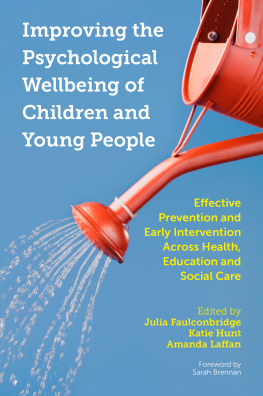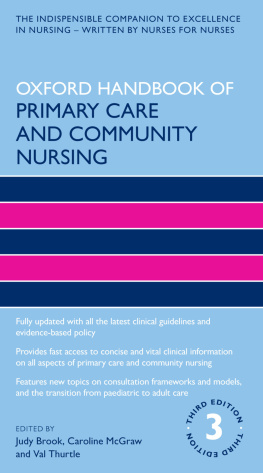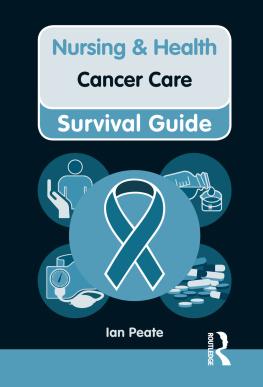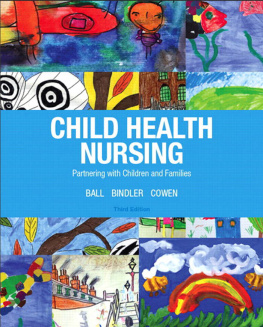An Introduction to Psychological Care
in Nursing and the Health Professions
Caring is at the core of what nurses and other health professionals do. But caring encompasses more than simply looking after people's physical health needs. People requiring any health service will have psychological needs that affect their feelings, thoughts, and behaviour. Good psychological care can even help improve physical health outcomes.
An Introduction to Psychological Care in Nursing and the Health Professions explains and promotes the importance of psychological care for people when they become physically ill, giving a sound theoretical basis to ensure care is evidence-based. It encourages the reader to think about the effects of illness and disability on patients, and to understand what can be done to identify and minimise any difficulties they might be experiencing in these areas. The chapters cover:
the meaning and elements of care and holistic care;
a model of psychological care in practice;
the personal qualities and skills of carers that best underpin psychological care delivery, and how these might be enhanced;
the knowledge needed for effective psychological caregiving;
psychological care as it might be practised in a range of health care settings.
This text contains key learning points, practical activities, reflective exercises and case illustrations. It is ideal for student and practising nurses, and health professionals who would like to improve their care for patients in this essential area.
Helena Priest is Senior Lecturer in the School of Psychology at Keele University, UK. She is currently Research Director for the Staffordshire/Keele University Doctorate in Clinical Psychology Training Programme.
An Introduction to Psychological
Care in Nursing and the
Health Professions
Helena Priest

First published 2012
by Routledge
2 Park Square, Milton Park, Abingdon, Oxon OX14 4RN
Simultaneously published in the USA and Canada
by Routledge
711 Third Avenue, New York, NY 10017
Routledge is an imprint of the Taylor & Francis Group, an informa business
2012 Helena Priest
The right of Helena Priest to be identified as author of this work has been asserted by her in
accordance with sections 77 and 78 of the Copyright, Designs and Patents Act 1988.
All rights reserved. No part of this book may be reprinted or reproduced or utilised in any
form or by any electronic, mechanical, or other means, now known or hereafter invented,
including photocopying and recording, or in any information storage or retrieval system,
> without permission in writing from the publishers.
Trademark notice: Product or corporate names may be trademarks or registered
trademarks, and are used only for identification and explanation without intent to infringe.
British Library Cataloguing in Publication Data
A catalogue record for this book is available from the British Library
Library of Congress Cataloging in Publication Data
A catalogue record for this book has been requested from The Library of Congress
ISBN: 9780415429078 (hbk)
ISBN: 9780415429085 (pbk)
ISBN: 9780203804865 (ebk)
Typeset in Times
by Keystroke, Station Road, Codsall, Wolverhampton
In memory of my dear mother, Mary Ellen Stanworth, 19132007
Contents
Figures and tables
Figures
Tables
Preface
The development of caring skills must be the primary aim of any programme preparing students for professional registration
(Royal College of Nursing of the United Kingdom, 2004)
This strong and ambitious statement, in the context of nursing practice, has thrown out a challenge to those involved in healthcare education to explore what is meant by caring skills, and how these skills are developed by those entering and remaining in nursing and health care professions. This book sets out to differentiate between the skills needed to care for peoples physical health needs, and those needed to care for other aspects of everyday human experience, particularly the psychological needs that affect peoples feelings, thoughts and behaviour. In this way, it aims to explain and promote the importance of psychological care for people when they become physically ill and in need of health care services.
Despite increasing evidence from fields such as nursing, medicine and psychology about the centrality of psychological care in illness, it remains a neglected area of clinical research. Indeed, there have been relatively few research studies into the meaning of caring generally. There appears to be little consensus about the precise nature and dimensions of psychological care and how psychological care-giving abilities are acquired. There is also some doubt as to whether such abilities can be taught, or whether they are developed solely through experience, and indeed whether everyone can develop psychological care-giving abilities. This book explores these topics and aims to answer some of these questions.
The idea for the book started many years ago, based on my experiences of teaching and supporting general (adult branch) student nurses from a large teaching hospital, who undertook a statutory three-month placement in a mental health care setting. As well as gaining experience of working with people with mental health needs, these students were to be equipped with some knowledge of human psychological functioning, so that they would be better able to recognise and address the psychological needs of physically ill patients when they returned to practise in adult nursing settings.
These students often arrived with a set of values and priorities which were very different from those whose chosen field was mental health nursing. Their priorities in nursing care were, quite rightly, focused on the relief of physical suffering and on practical, clinical tasks. To them, legitimate work entailed physical activity, being busy, being on the move. They frequently expressed frustration with the nature of mental health nursing work, arguing that in their own care settings they would not have time to spend an hour sitting listening to someones troubles or observing someones mood and behaviour, and that even if they did, this would not be seen as real work by the qualified staff on the ward.
Furthermore, they did not see the relevance of learning about psychological concepts and theories in helping them to care for patients needs. Interestingly, only a few years later, a new curriculum was designed for nurses in the UK (commonly known as Project 2000), which aimed to put a much stronger emphasis on the knowledge base underpinning nursing care delivery. To this end, students from all branches would spend the first eighteen months of their three-year programme developing a firm grounding in behavioural, life and social sciences (UKCC 1989), with very little of that time to be spent in clinical practice settings. As part of this initiative, Project 2000 educational programmes recommended that twenty-two hours be devoted to psychology in the curriculum. My early experiences gained teaching psychology to Project 2000 students again challenged the significance and relevance of behavioural and social science knowledge to the care of people with physical health problems and needs, even when these topics were integrated and applied to practice within the curriculum. It was these experiences that provided the first real motivating factor to undertake the research which led to this book. I quickly came to question the relevance of equipping student nurses with knowledge of psychological concepts, no matter how skilfully applied to nursing. The only reason for doing this, as far as I could see, was if it made any real impact on nursing care. I suspected that it did not. My initial interest, therefore, was in identifying a relationship between what was taught and what happened in practice, and I acknowledge that my expectation that teaching psychology to nurses had little or no influence on care delivery produced an early source of bias that could have impacted on the research. However, Ramproguss (1995) study of Project 2000 students also illustrated deficiencies with this approach emphasising theory and knowledge:










